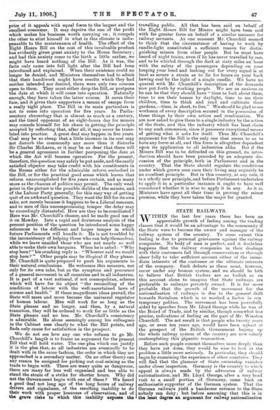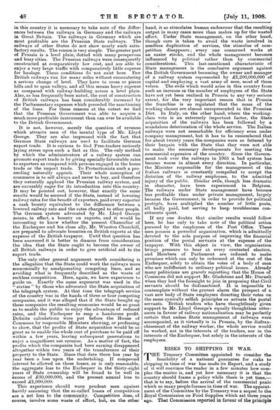STATE RAILWAYS.
WITHIN the last few years there has been an appreciable growth of feeling among the trading classes that it would be an advantage to the community if the State were to become the owner and manager of the railway system of the country. To some extent this feeling is due to personal grievances against the railway companies. No body of men is perfect, and it doubtless happens that the railway companies in their dealings with their customers fail through conservatism or through sheer folly to take sufficient account either of the imme- diate interests of the customer or the ultimate interests of the company. Such defects as these must, however, occur under any human system, and we should be loth to believe that British traders are so foolish as on this account alone to imagine that State railways are preferable to railways privately owned. It is far more probable that the growth of the movement for the nationalisation of railways is due to the general drift towards Socialism which is so marked a factor in con temporary politics. The movement has been powerfully aided by speeches from Mr. Lloyd George while he was at the Board of Trade, and by similar, though somewhat less precise, indications of feeling on the part of Mr. Winston Churchill. The net result is that people who twenty years ago, or even ten years ago, would have been aghast at the prospect of the British Government buying up the whole railway system of the country are now calmly contemplating this gigantic transaction.
Before such people commit themselves more deeply than they have yet done, they would be wise to look at the problem a little more seriously. In particular, they should begin by examining the experience of other countries. They will find that the glamour of State ownership vanishes under closer inspection. Germany is the country to which appeal is always made by the advocates of railway nationalisation, and Mr. Lloyd George, after a very brief visit to a small portion of Germany, came back an enthusiastic supporter of the German system. That the German railways yield a handsome revenue to the State nobody can deny; but before assuming that this is in the least degree an argument for railway nationalisation in this country it is necessary to take note of the differ- ences between the railways in Germany and the railways in Great Britain. The railways in Germany which are most profitable are the Prussian State railways. The railways of other States do not show nearly such satis- factory results. The reason is very simple. The greater past of Prussia is a level plain, dotted with many prosperous and busy cities. The Prussian railways were consequently constructed at comparatively low cost, and are able to enjoy a very large traffic with comparatively little expense for haulage. These conditions do not exist here. Few British railways run for many miles without encountering a serious change of level. They have to cross or pierce hills and to span valleys, and all this means heavy expense as compared with railway-building across a level plain. Also, as has frequently been noted, the cost of construction of British railways has been considerably increased by the Parliamentary expenses which preceded the sanctioning of the lines. For these reasons at the outset we find that the Prussian Government was able to acquire a much more profitable instrument than can ever be available to the British Government.
It is not, however, merely the question of revenue which attracts men of the mental type of Mr. Lloyd George. They are also impressed with the fact that German State railways are used to facilitate German export trade. It is curious to find Free-traders seriously laying stress upon such a fact as this. The only method by which the administrators of a railway system can promote export trade is by giving specially favourable rates to exporters as compared with persons engaged in the home trade or the import trade. To Protectionists such a pro- ceeding naturally appeals. Their whole conception of commerce is to sell always and never to buy, and therefore they naturally applaud the Prussian railway system, and are excusably eager for its introduction into this country. It may be pointed out, however, that exactly the same results would be secured if the State, instead of lowering railway rates for the benefit of exporters, paid every exporter a cash bounty equivalent to the difference between a lowered railway rate and the rates charged to other people. The German system advocated by Mr. Lloyd George means, in effect, a bounty on exports, and it would be interesting to know whether the present Chancellor of the Exchequer and his close ally, Mr. Winston Churchill, are prepared to advocate bounties on British exports at the expense of the British taxpayer. Until that question has been answered it is better to dismiss from consideration the idea that the State ought to become the owner of all British railways in order to give artificial aid to the export trade.
The only other general argument worth considering is the allegation that the State could work the railways more economically by amalgamating competing lines, and so avoiding what is frequently described as the waste of reckless competition. Here, again, we have experience to guide us. Exactly the same argument was used in the " sixties " by those who advocated the State acquisition of the telegraph system. At that time the telegraph service of the country was in the hands of three or four competing companies, and it was alleged that if the State bought up these companies the resulting economies would be so great as to enable the public to enjoy the advantage of reduced rates, and the Exchequer to reap a handsome profit. Definite calculations were put before the House of Commons by responsible Ministers showing, or professing to show, that the profits of State acquisition would be so great as to enable the whole cost of purchase to be paid off within a few years, leaving subsequent generations to enjoy a magnificent net revenue. As a matter of fact, the profits which the companies had been earning disappeared altogether within two years of the transference of their property to the State. Since that date there has year by year been a loss upon the undertaking. If compound interest be allowed on these losses, as is only reasonable, the aggregate loss to the Exchequer in the thirty-eight years of State ownership will be found to be well in excess of £30,000,000, and the present annual loss to exceed £1,000,000.
This experience should warn prudent men against hastily assuming that the so-called losses of competition are a net loss to the community. Competition does, of course, involve some waste of effort, but, on the other hand, it so stimulates human endeavour that the resulting output in many cases more than makes up for the wasted effort. Under State management, on the other hand, though care is taken to avoid the waste involved in needless duplication of services, the stimulus of com- petition disappears ; every one concerned works at an easier stroke, and the whole management becomes influenced by political rather than by commercial considerations. This last-mentioned characteristic of State management is the conclusive argument against the British Government becoming the owner and manager of a railway system represented by £1,200,000,000 of capital and employing a vast army of men, most of them voters. The evils which would arise in this country from such an increase in the number of employees of the State have not yet been realised in Prussia to any very serious extent, for the very important reason that in Prussia the franchise is so regulated that the mass of the working classes are almost unrepresented in the Prussian Diet. In Italy, on the other hand, where the working- class vote is an extremely important factor, the State acquisition of the railways has been followed by a scandalous deterioration of the whole service. The Italian railways were not remarkable for efficiency even under company management, but it has to be remembered that for about twenty years the companies were so fettered by their bargain with the State that they were not able to make the necessary developments for meeting the commercial expansion of the country. Since the Govern- ment took over the railways in 1905 a, bad system has become worse in almost every direction. In particular, the Minister responsible for the management of the Italian railways is constantly compelled to accept the dictation of the railway employees, to the admitted injury of the public. Similar evils, though less dramatic in character, have been experienced in Belgium. The railways under State management have become less profitable than under private management, largely because the Government, in order to provide for political prot4gds, have multiplied the number of little posts, all badly paid, but serving to keep troublesome con- stituents quiet.
If any one doubts that similar results would follow here, he has only to take note of the political action pursued by the employees of the Post Office. These men possess a powerful organisation, which is admittedly devoted to the sole purpose of improving the financial position of the postal servants at the expense of the taxpayer. With this object in view, the organisation brings pressure to bear at every contested election, and Members of Parliament are induced, to make promises which can only be redeemed at the cost of the Exchequer, solely to obtain the votes of a body of men who are indifferent to ordinary political issues. Already Many politicians are gravely regretting that the House of Commons did not support Mr. Gladstone and. Mr. Disraeli when they had the foresight to join in proposing that Civil servants should be disfranchised. It is impossible to contemplate without the gravest alarm the prospect of a vast new body of State employees directing their votes on the same cynically selfish principles as actuate the postal servants. British traders who have thoughtlessly given support to Mr. Lloyd George's equally thoughtless utter- ances in favour of railway nationalisation may be perfectly certain that unless State management of railways were accompanied, as it virtually is in Prussia, by the disfran- chisement of the railway worker, the whole service would be worked, not in the interests of the traders, nor in the interests of the Exchequer, but solely in the interests of the employees.







































 Previous page
Previous page